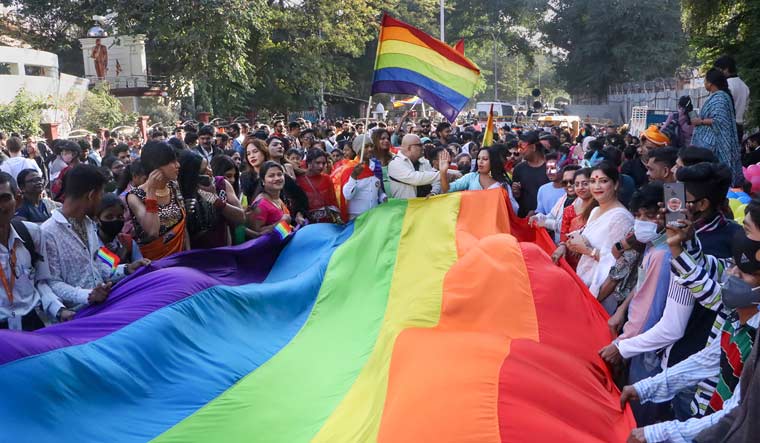The Misleading Trope Of Gay Marriages In India Being ‘Urban’, ‘Elitist’
May 19, 2023 | Shalini Rai
FILE PHOTO: LGBTQ members take part in a pride parade, in Nagpur, Maharashtra (Image: PTI)
A few weeks ago, the Centre submitted before the Supreme Court of India that gay marriages are an ‘urban, elitist’ concept. This was while the Centre urged the constitution bench of the Supreme Court to dismiss a batch of petitions seeking recognition of same-sex marriage in India. The court has seen filing of atleast 15 petitions demanding legal recognition for same-sex marriages.
However, the Supreme Court bench remarked that the Central government cannot dub homosexuality and the idea of same-sex marriage as an “urban elitist” concept, especially in the absence of any data to back this claim. “It may be more urban in its manifestations because more people in urban areas are coming out of the closet,” CJI DY Chandrachud orally remarked.
A five-judge constitution bench headed by Chief Justice of India D Y Chandrachud, Justice Sanjay Kishan Kaul, Justice P S Narsimha, Justice Hima Kohli and Justice S Narsimha was scheduled to hear the batch of petitions. Submitting a fresh application, Centre maintained that the petitions before the court reflect urban elitist views for the purpose of social acceptance.
This belligerent stance of the Central government tells us a lot about its motivations and convictions with regard to homosexuality and gay marriages. First of all, it demonstrates a complete denial of the ground reality of homosexual cohabitation in India. Something the Centre wants us to believe is ‘urban’, ‘elitist’ and ‘borrowed from the West’ has in fact been a part of the Indian lived reality for decades. Just because it finds it easy to castigate anything ‘western’/occidental does not necessarily render it true.
Indian history and culture is replete with instances where homosexuality has not only been ‘tolerated’ but accepted. In the temples of Khajuraho, there are carvings of men displaying their genitals to other men and women embracing each other. There is mention of Lord Ram’s devotee Hanuman having seen ‘Rakshasa’ women kissing and embracing each other in the Valmiki Ramayana. Composed around the 4th century BC, the ninth chapter of Vatsayayana’s Kamasutra talks about oral sexual acts (Auparistaka), homosexuality and similar activities among transgenders (tritiya prakriti).
Same-sex marriages, by their very nature, are such a private decision that the state has no business attempting to dictate terms regarding it to the stakeholders. Who an adult chooses to have sexual relations with and enter into matrimony with, is clearly a very personal decision and it does not behoove the state (in this case, the Central government) to act as a nanny state while dealing with this very private of acts.
So, what could have prompted the Centre to barge into the issue in the first place? Could it be that because of its very nature, the ruling dispensation at the Centre erroneously believes that it possesses the moral right to police people’s private lives and dictate terms to them regardless of the breach of propriety and decorum inherent to such interventions?
Could it be that the powers-that-be are so high on the intoxicant that power sometimes can prove to be that they have given short shrift to people’s concerns about and outrage over such stances?
Or could it simply be a case of a misguided bunch of ‘elders’ bent upon manipulating everything, from voting patterns to sexual preferences, according to their vision of a ‘shining India’?
The wise among us know when to intervene and when to stay away and watch the course of history from afar. Although it may seem impossible at the moment, the wisest thing the current Central government can do is abstain from making any kind of intercession into the bedrooms of Indian citizens. Time is likely to prove that if they (Indians) are mature enough to elect a government to power (or not), they are certainly mature enough to make the right decisions about who to invite into their private lives (or not).
In addition, all the available evidence — cultural and historical — points to the unimpeachable fact that same-sex relationships in India are not and have never been either ‘urban’ or ‘elitist’ or both. Love knows no boundaries, least of all demographic divides and any suggestions to the contrary can easily be dismissed as both ridiculous/absurd and misleading.
